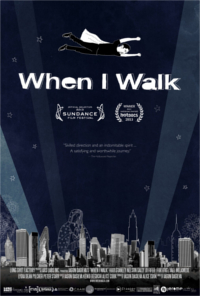Encasing Life In Amber: DaSilva Docs Descent With MS
 In the brief years leading up to 2006, Jason DaSilva was a healthy young filmmaker, traveling the world with camera in hand, documenting the movement of fellow man in cultures foreign and alive. Little did he know that at the age of 25 he would receive the devastating news that his own freedom of movement would slowly but surely be taken from him by the crippling hands of multiple sclerosis, frequently termed as MS. Medically, nothing can be done. There is no cure and no effective treatments that help ease the process. He will inevitably lose his ability to move, speak and possibly even see, but before that happens DaSilva wants to make something of the time he has. Likely to be his final film, When I Walk sees the filmmaker bravely turning the camera on himself to give us the explicit experience of everyday life with such a catastrophic disease. Though his story is clearly tragic, it is also one full of love and longevity in the face of inescapable silence – a story that aims to memorialize a man whose potential children may never truly know the man himself.
In the brief years leading up to 2006, Jason DaSilva was a healthy young filmmaker, traveling the world with camera in hand, documenting the movement of fellow man in cultures foreign and alive. Little did he know that at the age of 25 he would receive the devastating news that his own freedom of movement would slowly but surely be taken from him by the crippling hands of multiple sclerosis, frequently termed as MS. Medically, nothing can be done. There is no cure and no effective treatments that help ease the process. He will inevitably lose his ability to move, speak and possibly even see, but before that happens DaSilva wants to make something of the time he has. Likely to be his final film, When I Walk sees the filmmaker bravely turning the camera on himself to give us the explicit experience of everyday life with such a catastrophic disease. Though his story is clearly tragic, it is also one full of love and longevity in the face of inescapable silence – a story that aims to memorialize a man whose potential children may never truly know the man himself.
To be constantly wheelchair bound or bed ridden was an incomprehensible life for DaSilva, a restless spirit with the heart of an artist. Determined to overcome impending doom, it took a while for reality to set in. He started furiously working out and film shoots were scheduled on the other side of the world, but the increasing loss of mobility in his legs and continuously blurred vision forced him to abandon the project. With some encouragement, he decided to start attending a support group for those suffering with, or caring for, others with MS. There, against all odds, he met a beautiful young woman named Alice who’s own mother has MS. In the throes of physical decline, DaSilva’s guardian angel appeared and their life together began despite their knowledge of the situation. The occasional, reasonable self pity begins to transform into an examination of how our culture treats the disabled and how to lionize a life before it decays to the point of unrecognition.
The film itself would not have been finished without the physical help of Alice, who not only became a subject herself, but co-writer, camera operator, producer and editor as well, due to the fact that the musculature in DaSilva’s hands and legs had completely ceased functioning during the final stages of the project. Together, they pose pointed questions about what it means to achieve admirable life accomplishments, hold them precious and pass them on for future generations to be proud of. They spent countless hours creating this film together, and although it may be a gloomy yet inspirational piece about dealing with disease, their mission is to bottle life’s lightning while they still can and hopefully pass it on as a gift of memory to their children. Their collaboration on screen in everyday activities translates generally to the overall filmmaking process in a narrative ebb and flow that lends itself to the everyday challenges of MS and the intricate nature of intimate relationships themselves. When I Walk‘s faults lie in the fact that it began with a public audience in mind but morphed into something with an intention much more personal, eventually leaving you and I to imagine a future where things are hoped to be bright, but can only be grim and grizzly.


